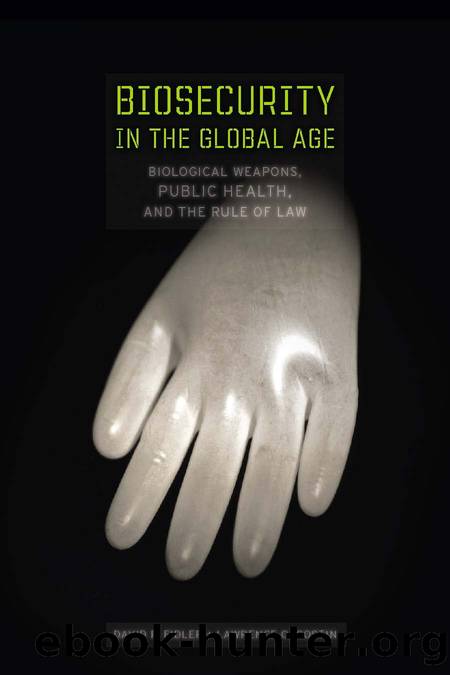Biosecurity in the Global Age by Fidler David P.;Gostin Lawrence O.;

Author:Fidler, David P.;Gostin, Lawrence O.;
Language: eng
Format: epub
Publisher: Stanford University Press
Published: 2011-10-03T00:00:00+00:00
III. BIOSECURITY, PUBLIC HEALTH GOVERNANCE, AND THE SYNERGY THESIS
The emergence of biosecurity as a policy concern has, without question, focused increased attention on public health surveillance and intervention capabilities at national and international levels. Perhaps no other development in the history of public health has created the awareness that now exists about public health infrastructure around the world. Recall, for example, the UN Secretary-Generalâs identification of infectious disease surveillance as a global priority in reforming the UN mentioned in Chapter 4.
Addressing the threats posed by biological weapons and resurgent infectious diseases requires robust public health surveillance and intervention capacities nationally and globally. Framing both threats as security challenges makes these public health governance functions more important politically than they had previously been. As Chapter 4 emphasized, security officials and public health experts reached the same conclusions about the condition of national and international public healthâsignificant improvements would be required for biosecurity to be achieved. The UN Secretary-General (2004, viii) again captured this consensus when he emphasized, âWe need to pay much closer attention to biological security.â
As mentioned earlier, a prominent feature of thinking about public health and security converging in biosecurity policy is the synergy thesis. This thesis posits that improvements made to public health benefit efforts against both biological weapons and infectious diseases. When an outbreak occurs, the first line of defense is the public health system, whether the outbreak was intentionally caused or naturally occurring. Thus, strengthening public health through biosecurity policy would achieve the dual purpose of defending against biological weapons and protecting societies from resurgent infectious diseases. The UN Secretary-General (2005, ¶93) appealed to the synergy thesis when he argued that strengthening public health has âdouble meritâ because it serves as a defense against bioterrorism and naturally occurring infectious diseases. Appeals to the synergy thesis often imply that biosecurity policy does not have to choose between security and public health, or between defense against biological weapons and protection from naturally occurring infectious diseases. Synergy arguments sometimes inform advocacy for governments to adopt an âall hazardsâ approach to biosecurity. This approach âwould offer political as well as security benefitsâ because ânatural outbreaks are inevitable but bioterrorist attacks are not,â which means that âpreparedness measures that cover all infectious disease threats would not only be far more cost-effective but politically more sustainable, particularly if a major bioterrorist event does not occur for many years, if everâ (Grotto and Tucker 2006, 21). The synergy thesis constitutes, thus, a major characteristic of the new world of public health governance.
Understanding the synergy thesis is, therefore, critical to evaluating biosecurity policies. Too often experts appeal to the synergy thesis without examining how robust the thesis is or whether the thesis contains tensions that affect policy formation and implementation. As subsequent sections of this chapter argue, the synergy thesis has merit but not as much as frequent uses of it suggest.
Close examination of surveillance and intervention reveal a more mixed situation that general references to the synergy thesis cannot explain. This situation means
Download
This site does not store any files on its server. We only index and link to content provided by other sites. Please contact the content providers to delete copyright contents if any and email us, we'll remove relevant links or contents immediately.
The Borden Murders by Sarah Miller(4313)
The Secret Barrister by The Secret Barrister(3696)
Police Exams Prep 2018-2019 by Kaplan Test Prep(2540)
Coroner's Journal by Louis Cataldie(2476)
The Splendid and the Vile by Erik Larson(2458)
Terrorist Cop by Mordecai Dzikansky & ROBERT SLATER(2072)
A Colony in a Nation by Chris Hayes(1927)
My Dark Places by James Ellroy(1926)
The Art of Flight by unknow(1872)
Black Klansman by Ron Stallworth(1790)
Objection! by Nancy Grace(1778)
A Life of Crime by Harry Ognall(1728)
The New Jim Crow by Michelle Alexander(1702)
Anatomy of Injustice by Raymond Bonner(1664)
American Prison by Shane Bauer(1656)
Invisible Women by Caroline Criado Perez;(1640)
Whoever Fights Monsters by Robert K. Ressler(1616)
Obsession (The Volkov Mafia Series Book 1) by S.E Foster(1575)
A is for Arsenic: The Poisons of Agatha Christie (Bloomsbury Sigma) by Kathryn Harkup(1538)
